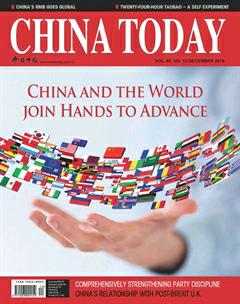Fang Yuan: Quebecois Teacher of Chinese Waiting in the Wings
By staff reporter DENG DI
Fang Yuan: Quebecois Teacher of Chinese Waiting in the Wings
By staff reporter DENG DI

Gazing at the Forbidden City, Fang Yuan recalled with emotion the elapse of time: how many yesterdays had gone while talking and laughing till dawn.
ONE of the Chinese language graduate students studying for their Masters in Teaching Chinese to Speakers of Other Languages (MTCSL) at Beijing Foreign Studies University (BFSU) is a tall Canadian who speaks fluent Chinese. His Chinese name is Fang Yuan.
Fang Yuan comes from Quebec. After getting his double bachelor degree in music and education at Mcgill University in Canada and learning Chinese from a tutor for three years, he decided to come to China to further his Chinese studies in 2014. His ambition is to learn Chinese and to be able to teach Chinese to foreign learners. And he’s well on his way. Fang Yuan’s ability to speak Chinese far exceeds that of most foreigners living in China. He has passed the HSK6 and is now preparing for a Putonghua Proficiency Test.
How well does Fang Yuan speak Chinese? Well, during our three-hour interview, he used plenty of buzzwords, including shuai dai (so handsome), wu yu (having nothing to say), and kongfangxiong (old Chinese coins), to name a few. And on his WeChat moments he even quotes well-known lines of classic Chinese poems such as “how many yesterdays had gone/while talking and laughing till dawn” to recall with emotion the elapse of time.
Fang Yuan modestly says his Chinese is not good enough; he has higher expectations of himself. When it comes to learning Chinese, he acclaims Beijing taxi drivers as big encouragers. Confident, warm-hearted and talkative cabbies always provide him excellent opportunities to practice speaking Mandarin. As increasing numbers of foreigners are coming to work in China, including one of Fang Yuan’s best friends from Canada who has decided to settle in Beijing, Fang Yuan also hopes to stay here longterm to pursue his ambition.
The Internet “Plus” Native English Speakers
According to Fang Yuan, he had seldom used a smart phone until he came to China. Back home in Canada, text messages, emails, and Facebook postswere the top-three media through which he kept in touch with his family and friends. Seeing that smart phone apps are so widely used in China, he decided to take advantage of the technology to enter the field of online learning, as many of his English-speaking friends now work on various “Internet plus”platforms as online English tutors. Videos or audio materials are often recorded with smart phone software before they get posted on those apps. Unlike traditional “chalk and talk” teaching methods, “multimedia and talk” is more student-engaging, and promoted by the educational departments of Beijing and many other big cities in China and around the world.
Fang Yuan, who has a BA in Education, has always wanted to be a teacher. Therefore in his spare time, he also practices recording videos in the same way. Online recording is not as easy as he imagined. It normally takes several hours to make a one-minute video. As many native English speakers in China work as English teachers or editors, he also hopes to work in the educational sector here. Beijing’s efforts to attract top-notch talent has made competition fierce, and locating a decent full-time job not easy at the moment. Consequently, people need to improve their skillset to get the jobs they want.
Life on the Go vs a Gentler Pace
Life in China suits Fang Yuan down to the ground. Express delivery and the high-speed rail network are just two things which have transformed his lifestyle. He and his friends prefer to shop around online using price-comparison sites to buy food and clothes from China and around the world. While we were talking, Fang Yuan got a call about a box of milk he ordered the day before, which to his astonishment had arrived. These things do make life convenient, but at the same time there are downsides to the frenetic pace of life in Beijing. He often feels stressed and enjoys travelling around China to relieve the pressure.
Last year he worked as a volunteer in western Hunan Province. When recalling his time there, Fang Yuan gets quite nostalgic. The locals’ simple way of life particularly appeals to him. He still misses the gentle pace of life there, and the classical beauty that mountains and rivers add to the small southern town. His arrival aroused a lot of curiosity – the local people had previously only seen foreigners on TV – but two days later things went back to normal and people began treating him as just another local resident. Their friendliness lingers on in his memory. “We have a phrase in English– celebrate our differences. I think that’s the feeling I got there,” he said.

Fang Yuan poses for a photo in front of his namesake souvenir store in Xitang Town, Zhejiang Province.
Fang Yuan hopes that this dynamic country can maintain its confidence and uniqueness on its journey to even greater success.
Autumn, nicknamed “golden autumn,” is the best season in Beijing. A sudden drop in temperature made for an extraordinarily cold October this year. Fang Yuan joked that he was like somebody from Dongbei (Northeast China), as the latitude of Quebec is close to that of Harbin, a northeastern city. He finds China very different to Canada though. There are modern cities interspersed with traditional rural villages, buildings which are thousands of years old, and a rich and colorful culture which constantly surprises everybody who comes here.
Looking Ahead
According to new rules governing the issue of foreigners’ work permits in China, Chinese language proficiency will be among major criteria for foreigners looking to stay here in the future. As a result, foreign residents will need to study Chinese hard. Fang Yuan approves of this new measure. He sees it as encouragement from the Chinese government as well as a way of promoting Chinese language learning.
Unlike in some foreign countries where Chinese or Sinology is quite marginalized, Canada has enjoyed an influx of Chinese culture as a result of the large number of Chinese immigrants. That is how Fang Yuan became familiar with China. As a little kid, he gained an impression of how ancient Chinese taught people to cherish every grain of rice since each came from hard work. His Chinese name, Fang Yuan (literally square and round, and often figuratively used to indicate accomplishment, is taken from the old Chinese saying, “Nothing can be accomplished without norms or standards”), was suggested by a Chinese masseur who worked in Canada. It is not only easy to remember but the meaning also expresses his hope that he can follow his dream without crossing any boundaries.
Two years ago, when he first arrived in China, he fell in love with Chinese food, especially spicy dishes, at first“bite.” Hunan cuisine, Sichuan cuisine, Shaanxi roujiamo (Chinese hamburger), and stewed pork in brown sauce are among his favorites. He is busy working on his graduation thesis on the four tones in Chinese pronunciation, and next year will graduate from BFSU.
Two years of life gives him a view of a multi-faceted China. On the one hand, the country is an ancient culture going back thousands of years with dynamic modern cities comparable to New York and London. On the other, environmental issues and poverty exist in many corners similar to those in some underdeveloped countries. Fang Yuan hopes that this dynamic country can maintain its confidence and uniqueness on its journey to even greater success.

